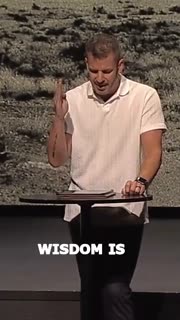Finding Meaning Beyond the Pursuit of Pleasure
Summary
### Summary
Good morning, everyone. Today, we continue our journey through the book of Ecclesiastes, a unique and often perplexing part of the Bible. This series, "Chasing the Wind," aims to provoke thought and questions about life, much like the ancient Hebrew tradition of learning through inquiry. Ecclesiastes, attributed to Solomon, challenges us to question the meaning and purpose of our pursuits, especially in light of our faith in Christ.
We began by exploring the concept of "hevel," a Hebrew word often translated as "meaningless" or "vanity," but more accurately described as mist or vapor—something real yet fleeting and ungraspable. Solomon's quest to find what is good led him to explore various pleasures: visual beauty, achievements, and physical experiences. While these pleasures are not inherently bad, they become "hevel" when pursued for their own sake rather than as gifts from God.
The key to finding meaning in these pleasures lies in our focus. If we center our lives on the gifts themselves, we end up chasing the wind. However, if we focus on the Giver—God—we find balance and purpose. This perspective aligns with James 1:17, which reminds us that every good and perfect gift comes from above.
Solomon also contrasts wisdom and folly, noting that while wisdom is better because it helps us see our next steps, both the wise and the foolish ultimately face the same fate: death. This realization pushes us to seek a life of significance rather than mere success. It's about living for others and leaving a legacy that outlasts us.
In the final part of today's reading, Solomon grapples with the frustration of leaving his hard-earned achievements to someone who may squander them. Yet, he concludes that finding satisfaction in our work and enjoying life's simple pleasures are gifts from God. This satisfaction comes from recognizing that our abilities and opportunities are divine gifts meant to be used for His glory.
As we move forward, let's focus on living lives of purpose and meaning, acknowledging that everything we have is a gift from God. Let's strive to leave a legacy that honors Him and impacts the next generation.
### Key Takeaways
1. The Nature of "Hevel": The Hebrew word "hevel" describes life as a mist or vapor—real but fleeting and ungraspable. This concept challenges us to find deeper meaning beyond the temporary pleasures and achievements of life. By focusing on the Giver rather than the gifts, we can find lasting purpose and balance. [04:58]
2. Three Types of Pleasure: Solomon identifies three categories of pleasure: visual beauty, achievements, and physical experiences. While these can bring joy, they become meaningless when pursued for their own sake. True fulfillment comes when we recognize these pleasures as gifts from God and use them to glorify Him. [09:21]
3. Wisdom vs. Folly: Wisdom helps us see our next steps and grow, while folly leads to regret and shame. However, both the wise and the foolish face the same fate: death. This realization pushes us to seek a life of significance, living not just for ourselves but for others and for God's glory. [24:02]
4. Living a Life of Significance: Solomon's reflections remind us to live lives that make a difference. This involves focusing on the next generation and leaving a legacy that honors God. It's about pouring out our wisdom, knowledge, and resources to impact others positively. [35:15]
5. Finding Satisfaction in Work: Solomon concludes that finding satisfaction in our work and enjoying life's simple pleasures are gifts from God. This satisfaction comes from recognizing that our abilities and opportunities are divine gifts meant to be used for His glory. By attaching meaning to our daily tasks, we can find true contentment. [41:58]
### YouTube Chapters
[0:00] - Welcome
[02:03] - The Purpose of Ecclesiastes
[03:16] - Introduction to Alpha Program
[04:07] - Understanding "Hevel"
[06:01] - Reading Ecclesiastes Chapter 2
[08:42] - The Quest for Pleasure
[09:21] - Three Types of Pleasure
[12:21] - The Fulcrum Illustration
[14:58] - James 1:17 and Divine Gifts
[17:26] - The Need for Encouragement and Reward
[22:59] - Wisdom vs. Folly
[24:02] - Living a Life of Significance
[29:22] - Dead Poets Society Illustration
[31:34] - The Frustration of Legacy
[33:25] - Finding Satisfaction in Work
[35:15] - The Importance of the Next Generation
[41:58] - Exhaling and Finding Contentment
[45:15] - Walking in Step with the Holy Spirit
[47:06] - Trusting God with Our Lives
[48:43] - Closing Prayer and Invitation for Prayer
Study Guide
### Bible Reading
1. Ecclesiastes 2:1-11 - Solomon's quest for pleasure and its futility.
2. James 1:17 - Every good and perfect gift is from above.
3. 1 Timothy 4:4-5 - Everything God created is good and should be received with thanksgiving.
### Observation Questions
1. What are the three types of pleasure Solomon identifies in Ecclesiastes 2:1-11? How does he describe their ultimate value? [09:21]
2. According to James 1:17, where do all good and perfect gifts come from? How does this perspective change our view of life's pleasures? [14:58]
3. In 1 Timothy 4:4-5, what is the condition for something to be considered good and not rejected? How does this relate to Solomon's reflections on pleasure? [15:47]
4. What does Solomon conclude about the pursuit of wisdom versus folly in Ecclesiastes 2:12-16? How does this realization affect his view on life? [24:02]
### Interpretation Questions
1. Solomon describes life as "hevel," meaning mist or vapor. How does this concept challenge our pursuit of temporary pleasures and achievements? [04:58]
2. How does focusing on the Giver (God) rather than the gifts (pleasures) provide a deeper sense of purpose and balance in life? [13:32]
3. Solomon expresses frustration about leaving his achievements to someone who may squander them. How does this reflect on the importance of living a life of significance and legacy? [31:34]
4. How does the idea that "every good and perfect gift is from above" (James 1:17) influence our understanding of satisfaction and contentment in our daily work and pleasures? [14:58]
### Application Questions
1. Solomon identifies three types of pleasure: visual beauty, achievements, and physical experiences. Which of these do you find yourself most drawn to, and how can you shift your focus to see them as gifts from God rather than ends in themselves? [09:21]
2. Reflect on a time when you pursued something for its own sake and found it ultimately unfulfilling. How can you reframe such pursuits to align with God's purpose for your life? [13:32]
3. Solomon's realization that both the wise and the foolish face the same fate (death) pushes us to seek a life of significance. What steps can you take to ensure your life leaves a positive legacy for the next generation? [24:02]
4. How can you find satisfaction in your current work or daily tasks by recognizing them as divine gifts? What practical steps can you take to attach meaning to your daily activities? [33:25]
5. Solomon's frustration about leaving his achievements to someone who may squander them highlights the importance of mentoring and investing in others. Who in your life can you pour into to ensure your knowledge and skills are passed on meaningfully? [31:34]
6. The sermon mentioned the importance of living with a divine perspective. How can you cultivate a mindset that consistently acknowledges God as the source of all good things in your life? [14:58]
7. Reflect on the idea of "exhaling" and finding contentment in your work. What practices can you incorporate into your routine to regularly pause, give thanks, and find satisfaction in what you have accomplished? [41:58]
Devotional
Day 1: The Fleeting Nature of Life
Description: The Hebrew word "hevel" is often translated as "meaningless" or "vanity," but it more accurately describes something real yet fleeting, like mist or vapor. This concept challenges us to look beyond the temporary pleasures and achievements of life. By focusing on the Giver—God—rather than the gifts themselves, we can find lasting purpose and balance. This perspective helps us understand that while life’s pleasures are real, they are also transient and ungraspable. Recognizing this can lead us to a deeper appreciation of the eternal and the divine. [04:58]
Ecclesiastes 1:14 (ESV): "I have seen everything that is done under the sun, and behold, all is vanity and a striving after wind."
Reflection: Think about a recent pleasure or achievement in your life. How can you shift your focus from the temporary joy it brings to the eternal significance it holds as a gift from God?
Day 2: Recognizing True Fulfillment
Description: Solomon identifies three categories of pleasure: visual beauty, achievements, and physical experiences. While these can bring joy, they become meaningless when pursued for their own sake. True fulfillment comes when we recognize these pleasures as gifts from God and use them to glorify Him. This understanding helps us to enjoy life’s pleasures without becoming enslaved by them. It also encourages us to see our achievements and experiences as opportunities to reflect God’s goodness and grace. [09:21]
Ecclesiastes 2:24-25 (ESV): "There is nothing better for a person than that he should eat and drink and find enjoyment in his toil. This also, I saw, is from the hand of God, for apart from him who can eat or who can have enjoyment?"
Reflection: Identify one pleasure or achievement in your life that you have been pursuing for its own sake. How can you reframe it as a gift from God and use it to glorify Him?
Day 3: The Value of Wisdom
Description: Wisdom helps us see our next steps and grow, while folly leads to regret and shame. However, both the wise and the foolish ultimately face the same fate: death. This realization pushes us to seek a life of significance rather than mere success. It’s about living for others and leaving a legacy that outlasts us. Wisdom, therefore, is not just about making smart choices but about making choices that have eternal significance. [24:02]
Ecclesiastes 7:11-12 (ESV): "Wisdom is good with an inheritance, an advantage to those who see the sun. For the protection of wisdom is like the protection of money, and the advantage of knowledge is that wisdom preserves the life of him who has it."
Reflection: Reflect on a recent decision you made. Was it driven by wisdom or folly? How can you ensure that your future decisions are guided by wisdom that seeks eternal significance?
Day 4: Living a Life of Significance
Description: Solomon’s reflections remind us to live lives that make a difference. This involves focusing on the next generation and leaving a legacy that honors God. It’s about pouring out our wisdom, knowledge, and resources to impact others positively. Living a life of significance means that our actions today will have a lasting impact on those who come after us. It’s a call to invest in people and causes that reflect God’s love and justice. [35:15]
Psalm 78:4 (ESV): "We will not hide them from their children, but tell to the coming generation the glorious deeds of the Lord, and his might, and the wonders that he has done."
Reflection: Think of one way you can invest in the next generation this week. How can you use your wisdom, knowledge, or resources to make a lasting impact?
Day 5: Finding Satisfaction in Work
Description: Solomon concludes that finding satisfaction in our work and enjoying life’s simple pleasures are gifts from God. This satisfaction comes from recognizing that our abilities and opportunities are divine gifts meant to be used for His glory. By attaching meaning to our daily tasks, we can find true contentment. This perspective helps us see our work not as a burden but as a divine calling, an opportunity to serve God and others. [41:58]
Colossians 3:23-24 (ESV): "Whatever you do, work heartily, as for the Lord and not for men, knowing that from the Lord you will receive the inheritance as your reward. You are serving the Lord Christ."
Reflection: Consider your current work or daily tasks. How can you find deeper satisfaction by recognizing them as opportunities to serve God and others? What changes can you make to align your work with this perspective?
Quotes
### Quotes for outreach
1. "If I focus on the gift, if I focus on the pleasure, if I focus on the outcome, it's not going to last. However, if I focus on the one, on the giver of the gift, this is what I do. If I move towards the giver, I can still hold it in balance. Because I've moved. I've now given this purpose. I've given it meaning. I've attached the giver and not focused on the gift." [13:32] (28 seconds)
2. "Every good and perfect gift is from above. Coming down from the Father of the heavenly lights who does not change like shifting shadows. So, yes, the things in life, it's got everything to do with who is the giver, not the gift. There's a posture. And so some people want to go, oh, you can't enjoy life and be a Christian. No, no, no, no, no, no. See that? That's just fun, but fun, just for having fun, that's evil." [14:58] (31 seconds)
3. "Rejoice always. Pray continually. Give thanks in all circumstances for this is God's will for you in Christ Jesus. So when storms come and difficulties come and pressures come, I move to it. Rejoice always. A situation comes and it's like difficult. Pray continually. It's all good. Give thanks in all circumstances and move. You know what, friends? You know what this is called? Walking in step. With the Holy Spirit." [45:15] (36 seconds)
4. "You need to know that there. There is purpose in pleasure. There is purpose in reward. There is purpose in wisdom because it enables you to see maybe just the next step and trust him in that. There is purpose when we live our lives in divine order. Move to him when the pressures are coming and you think you can't take anymore. What is it today? Hevel? Boy, it's overwhelming me, Ez. Move. He's there. He's there." [47:06] (38 seconds)
### Quotes for members
1. "The purpose of my teaching these 12 weeks is to cause you trouble. It's to cause you to think and question life. The purpose of the, probably Solomon, we think it's Solomon, we're not sure it's Solomon, but it makes sense it's Solomon. I don't know for sure it's Solomon, but we'll just say it's Solomon who wrote Ecclesiastes. The purpose that he's doing is to cause the listener to question, to cause them to ask why, to cause them to be a little bit, what are you saying?" [02:03] (37 seconds)
2. "The way in which the ancient Hebrews would be taught by a rabbi would be, okay, here's the text, here's three verses, your homework is find 20 questions about the text. Not come and tell me what it means, 20 questions. Set questions, ask, yes, if this is this, then therefore what does that mean? What does this mean? How do I do this? What do I go now? What does it mean for my life here? What does it mean for her life? What does it mean for his life? How do I live this out in today's context? What about then? What about now? What about tomorrow? It's to cause questions." [02:03] (30 seconds)
3. "Wisdom is better than folly because wisdom will help you see what your next step is. Folly is you're walking in the darkness and you don't know where your feet are. You don't know where you're planted. Wisdom will cause you to constantly grow and learn. Folly will lead to regret and shame. Fact, that just needed to be said for some of you. You've got decisions, you've got options all the time in front of you. Wisdom is better than folly." [24:45] (37 seconds)
4. "Don't just pursue success, pursue significance. Don't just live life dark wise, mindlessly, do it with meaning. The way you do this, which will get revealed in the next section, is about living not just for you. It's always about other people. It's always about the legacy that will come or get into it. This life of significance and meaning is so important." [24:45] (30 seconds)
5. "You need a fresh revelation of the impact and the significance of what matters most. I said this, as I said, last Sunday was the first Sunday starting year 10 of me being here. The 10th year. But I said this right at the very, very beginning. 10 years ago, the most important generation is always the next one. Always is the next one. And the older you get, the next ones. Always. The moment you think it's all about you and what about me and my generation, you've missed it." [35:15] (38 seconds)









